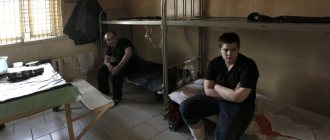Behavior rules
What are the rules of conduct in a pre-trial detention center ?
Don’t take this as a joke, but the more dignified you behave in a pre-trial detention center, the more comfortable your time spent here will be, in most cases. What does “more worthy” ? The same as in the life remaining on the other side of the door of this unattractive establishment.
There is no need to throw yourself on the chest of the guards or the guard on duty receiving you, shouting about your innocence. You may be mistaken for a mentally ill person and end up in a punishment cell . You are here, which means the detention was authorized and, albeit erroneously, you were taken into custody. The extent to which justice was missed will be determined by the investigation and the lawyer, and your task is to survive the period as comfortably as possible, during which your future fate will be decided.
That's why:
- Behave calmly when questioning the duty officer.
- Do not try to offend the staff: soon you will have to establish contact with some of them to communicate with relatives.
- During the inspection, do not try to refuse to communicate with the doctor or hide something or jewelry. Wristwatches, cigarettes, lighters are also permitted items. It’s better to voluntarily hand over the rest of the contents of your pockets for inventory - it will be safe. It seems that they want to take away your product without having the right to do so? Demand to present a document prohibiting the detainee from having the subject of the dispute at the time of his stay in the pre-trial detention center.
- Stop trying to look for a “vest” or a “friend” among other detainees - everyone here is completely strangers . A subject who persistently asks about the circumstances of the case, family details or some “intimate” details of life is most likely not a “shirt guy”, but a person looking for profit or an informer.
News
“There is such tension there. A new girl would come into the cell, and some would just start laughing. Just. This is such uncontrollable hysterical laughter. This is an indescribable feeling. I don't know how you will convey this in the text. Probably not. This cannot be conveyed."
First days in pre-trial detention center
“The first days in a pre-trial detention center are the most terrible, it cannot be told, described,” recalls Valya (name changed), “you don’t know anything, you don’t understand, you’re scared by all sorts of books, films, stories about prison. And everything seems terrible, you are expecting a trick from all sides, that you will be beaten, raped, something will be taken away, but this does not happen, in fact.” Valya ended up in pre-trial detention center-6 (Moscow) in 2004, she was then 35 years old, and she spent a total of five years in the detention center.
In the photo: SIZO-6 (“Pechatniki”), Moscow
Once in “Pechatniki” (the name of pre-trial detention center-6 based on its location), she learned that prisoners do not rush at newcomers who have just arrived in the cell, do not take away things, do not explain “concepts” - much of what is shown in films about prison, in women’s detention centers and colonies, no. There is tension because there are several dozen people constantly next to you. There are sleepless nights - because of stress. There is a large chamber divided into three rooms, with no doors between them.
In one room there are 21 bunk beds (bunks) - respectively, 42 places. Near the beds there are bedside tables welded to the floor, in which you can store everything that is not prohibited: pencils, pens with blue paste (strictly ballpoint, not gel), notebooks, cosmetics, etc. Not allowed - varnish, acetone, red, black, green pens - to prevent tattoos. The next room is a toilet room, it has a shower (sometimes there is even hot water), two sinks, a footwash (women wash things in it). A little further on are three toilets, separated by a low brick partition. The toilet room, like all the others, is visible; there are peepholes in the doors and walls. The third room is a room for eating, the so-called kitchen. There are two large tables, benches, refrigerators, and a TV on the refrigerator (not in all cells). There is also a folding window into the chamber - “korma” - “food” is served into it. There are exactly half as many places in the kitchen as there are sleeping places in the cell. None of our interlocutors can answer the question “why this is so”, but they assume that this is so that they can eat in turns, although this is inconvenient - the time for eating is limited.
And that's not bad. In many pre-trial detention centers, the situation is much more modest. In pre-trial detention center-3 in Serpukhov, for example, there are no bedside tables, and all things are under the beds in bags. The beds line the walls, there is a table between them, and there are no benches. Women eat while sitting on the first tiers. There is no shower either, only a sink and a toilet surrounded by a curtain; you can wash in the bathhouse once a week.
“I recently went there and made a broadcast,” says Maria (name changed), who previously spent a year in a pre-trial detention center in Serpukhov. – I met a woman there, she has a daughter in a pre-trial detention center, she says that there is not even a bucket in the cell, there is nothing to wash in. There is nowhere to store food."
Relationships in the cell
There are no “authorities” among women, because women do not have “concepts” like men who go back to the criminal subculture. “It’s more like hazing,” explains one of the former prisoners. The one who sits longer has certain privileges, for example, sleeping in a more comfortable place - near a window, against a wall. In addition to the two-tier bunks, the cell has a so-called “glade” - four beds without second tiers. The cell eldest and her entourage or women who sit longer (“starosidy”) usually sleep here. There is a constant movement from bunk to bunk: when a more comfortable place becomes available, it is occupied by the one with the longest term. The one who sits the least, accordingly, sleeps on bunks located in less convenient places - near the toilet, aisle, closer to the door. Many women mention this door (it’s called “the brakes”) in their stories, saying “it constantly clangs” - almost everyone remembers the characteristic loud sound.
But sometimes newcomers may not even get such an inconvenient place - for example, in conditions of over-limit, which has recently become the main problem in Moscow pre-trial detention centers. Women cannot take turns sleeping like men, who know how to negotiate with each other. The first reason is the same “hazing”: “For example, I’ve been sitting in a pre-trial detention center for five years, and now they brought a new girl out of prison. Which of the two of us is more tired? I’m sick of everything, of all these identical stories, I’m on the verge of a breakdown. Shall I give her my seat? – explains Valya. The second is the issue of hygiene: of course, you can’t get infected with anything other than fungus and scabies, but the fact itself worries many. The third reason, according to Vali, is based on the fact that men, although formally, have a curfew, but they do not sleep, their life only begins after curfew. In a women's pre-trial detention center, if the officer on duty saw that someone was not lying in bed after lights out, they would write a report on her. Therefore, it is not possible to take turns sleeping.
By the way, women in prison - unlike men - are protected from tuberculosis; there are cases, of course, but in general the situation is much better than in men's pre-trial detention centers and zones where tuberculosis is one of the main dangers.
The physical condition of the prisoner is assessed by fellow inmates depending on the circumstances. Maria O. But at the same time, there are those who pretend - they pretend to be sick, because they don’t want to not only sleep on the floor, but simply climb onto the second tier (there are no ladders, like on a train, it’s inconvenient to climb, Maria explains) - "to the palm tree."
Entrepreneur Alexey Kozlov, who was imprisoned in pre-trial detention center No. 2 (Butyrska), says that in the men’s pre-trial detention center, the issue of sleeping places is decided by the person in charge: “People who participate in the life of the cell help with food, money, as well as thieves (who support the thieves’ movement) “They don’t have any problems with sleeping places.” In addition, such factors as the age and health status of the prisoner arriving in the cell are taken into account: “Everything is almost like being free,” notes the entrepreneur. And how long a person has served does not affect the authority and respect of his fellow inmates.
But this does not mean that women do not have solidarity. It is there, they support each other, share food. Often in prison, women live in so-called “families” (like men) - they unite in groups of two or three people, “family members”, eat together, help each other. For example, according to human rights activist Zoya Svetova, exceeding the limit in pre-trial detention center 6 brought some women together. Despite the cramped conditions - women do not have enough sleeping places, prisoners sleep on mattresses on the floor - women help each other, unite and write complaints together. At the same time, Anna Karetnikova says that nervousness is growing in the cells, because there are no free places, there is always a war and trade for cots and mattresses. Conflicts are inevitable, and harassment of fellow inmates begins.
But human rights activists agree that the living conditions in pre-trial detention center No. 6 are now very difficult due to the over-limit, and the staff do not strive to improve or alleviate the situation of the prisoners; even requests for second mattresses for those who sleep on the floor are not perceived by the staff as something something vital - they are used to giving out the same mattresses solely as an incentive for something. Well, for example, an applicant for a mattress will snitch on a cellmate that she has a prohibited item - nail or eyebrow tweezers, a blade or a pen with green ink.
“Many women cannot get to the doctor. Employees do not take checks seriously; there have been cases when statements were falsified that a person had a medical examination, but in fact he did not,” says Anna Karetnikova.
Zoya Svetova also speaks about this, noting that there are good employees, but there are few of them, they physically do not have time to keep track of everything.
A typical thing for a pre-trial detention center is a lack of vegetables and fruits, normal hot food, and basic things. There, a woman cannot simply open a closet or refrigerator and take what she needs. “If you have relatives who come to you, you start asking them to bring you washing powder, shampoo, basins, creams, some clothes. You remain a woman, you want to change your underwear, clothes, look normal,” says Valya. But not all prisoners have someone who can “warm” them from outside.
Informers
“There are at least five or six people in the cell who regularly visit the operative,” recalls Valya. They go to the operative - that is, they “knock.” One of the former prisoners talks about the practice of concluding an agreement between the administration of the pre-trial detention center and some prisoners on cooperation - the prisoners sign an unofficial “contract”, because the operatives really need someone to “knock” for them. This is not a legal document, but if it later comes up somewhere, your own people will “cut you into belts.” And then the mechanism works as follows:
“For example, a criminal case was opened against me, there is very little evidence, everything is sewn with white thread. You and I are sitting in the same cell, we are starting to be friends. I have no one to talk about my business with, I see in you a sincere person, I begin to believe that this will not go further than you, and I tell you something that plays against me. And it doesn’t occur to me that you are friends with me, because the operative told you to be friends with me. And the operative calls you once a week, and everything you tell ends up in the materials of my criminal case.”
Valya suggests that such “testimony” is not officially used, is not taken into account in court, but is transferred along with all the materials to the colony.
At the same time, the administration is not interested in all prisoners, first of all, leaders of public opinion, strong personalities who can influence the opinions of fellow inmates. They are intrusively offered to work together or simply begin to “break” them. And it’s not difficult to identify strong and weak people in prison. “Places of imprisonment reveal a person’s nature,” says Valya. – We are in the cell 24/7 in sight of each other. And even if a person comes in some kind of image that he invented for himself for an investigator, a lawyer, for someone else, in a maximum of a month this image subsides.”
Methods of administration
The female prisoners are literally kept within arm's length of each other at all times, and a person's character becomes clear quite quickly. The administration of the pre-trial detention center also sees this. The methods of influence may be different, but none of the interlocutors of Sitting Rus' mentions the use of physical force by pre-trial detention center employees.
“They don’t beat, but they find effective methods. Getting to know the operative begins with the fact that she offers help and support in exchange for the fact that you will tell her other people's stories and report on what is happening in the cell. So, she and I didn’t find a common language, and I, a lawyer by training, began to put forward some demands, to which I was told: “I’ll teach you, you won’t get away with it.” And I didn’t get away with it,” says Valya.
At that time, Valya had been in the pre-trial detention center for four months, had acquired a household, and had just received a parcel (in just a month, a prisoner can receive up to 30 kg in parcels). Very soon the duty officer came and, turning to Valya, said: “Be ready with all your things in an hour.” All things are the same parcel weighing 30 kg, personal belongings - about 20 kg, a mattress. Typically, the phrase “with all belongings” means that the prisoner is being transferred to another cell. The reason for transfer can be any - for example, a quarrel in the cell. “I roll up a mattress, a blanket, collect things, parcels, vegetables, which are rare and are generally eaten right away, because they spoil quickly, and you cannot order 10 kg of them, and the next parcel will only be in a month,” says Valya. She is transferred to a cell on another floor, at the opposite end of the corridor. The detention center building is three-story, the length of the corridors is about 200 meters.
That day, Valya was transferred from cell to cell three times: “Naturally, all that was left of my vegetables was juice. This is how I was taught life. That is, either you will break your back carrying these things, basins, mattress, or you will sit quietly and do what they say,” recalls Valya. The next day she informed the lawyer about this, but when he went to the head of the detention center, he was told that Valya had been transferred from the cell due to repairs, and in general, only one transfer was noted on her card: “There’s no need to beat her there - when it’s like that with you look like things, you’ve already beaten yourself.”
Naturally, for those who cooperate, the conditions of stay in the pre-trial detention center are not so strict - the detention center workers can turn a blind eye to any violations. One of the prisoners says that those who “knocked” received some small money transferred to their account. What the informer conveys to the operative turns into operational information from a classified source, which is then developed.
“This way, new episodes can appear in criminal cases,” says Irina, who served five years in pre-trial detention center No. 6. “But it is impossible to prove that the information came from a fellow inmate who was an informer.”
Some go to the operative so that they can get at least the necessary hygiene products, some for the sake of a positive entry in their personal file, some out of fear. And they are always afraid of everything, because they are punishing, because every woman wants all this to end like a bad dream, she wants to return to her family.
They punish the whole cell - for the “misdemeanor” of one person, the whole cell can gather with all their things and make three circles around the isolation ward from one end of the corridor to the other on all floors. If one of the prisoners begins to express dissatisfaction about something, the whole cell reacts negatively to this - prisoners have different ages, different health conditions, no one wants to walk around the detention center with all their things.
“All prisoners understand that this will happen, that punishment will definitely follow, and it will not be noted in any documents. Therefore, if someone in the cell starts to open their mouth, they quickly clamp it down,” explains Valya.
Alexey Kozlov claims that it is impossible to even imagine that there would be a similar regime in a men’s pre-trial detention center: “There is no such thing as the whole cell being taken out because of one person, punished. This could have serious consequences - prisoners could collectively cut their veins. And this is very bad for management, because this is an emergency, none of the employees are interested in this.” The main reason is that there are quite a lot of “authorities” among men; accordingly, they listen to such people and unite around them. “The leadership is not afraid of individuals, the leadership is afraid of the crowd,” notes Kozlov.
But such an authoritative person may also have certain agreements with the management: for example, that he will not allow prisoners to file complaints with the prosecutor’s office or the European Court of Human Rights. “For such agreements, the prisoner receives concessions, and the cellmate who violates the imposed ban can even be beaten,” says the entrepreneur.
At the same time, Alexey Kozlov sees the key difference between a men’s pre-trial detention center and a women’s pre-trial detention center in the fact that for men there is a so-called “road” (prison mail). This is a night rope communication system between cells: as a rule, notes are sent, sometimes tea, cigarettes. It is thanks to the “road” that male cameras can coordinate even in one night. “Road” is a mandatory attribute of the men’s pre-trial detention center. There are night “roads” for women, too, but the presence of inter-chamber communication here depends on the position of the eldest in the cell.
"Women walk over each other's heads"
The cell leader, one of the prisoners, keeps order; she is formally chosen by the cell, but the candidacy of the cell leader must be approved by the administration. The head of the cell must suit everyone, because her responsibilities include, firstly, ensuring order in the cell, starting with recording information about women arriving in the cell - full name, article, sentence, if any - and ending with preventing conflicts between prisoners. If problems arise in the cell, the elder may be punished. Secondly, she interacts directly with the administration. It doesn’t occur to anyone that the article of accusation, for example, is personal information.
In conditions of such control - both on the part of prisoners and on the part of the administration - it is almost impossible to protest even against the most unfair actions of operatives or employees of the pre-trial detention center. Women are dependent - especially in prison - they are very easy to influence, easy to intimidate or give false hope - every woman, while in a pre-trial detention center, most of all wants to go home, to her family, and for this she is often ready to do, say, sign anything will require:
“A lot of people just want to get out and don’t want problems. They say that the criminal world will eradicate itself, you just need to find the keys to it, and this key is found - leniency, parole, and women go over each other’s heads,” says Maria. Valya speaks about the same thing, repeating more than once: “In prison, women are often driven by fear, greed and stupidity. There are no concepts, no organization, so is even a semblance of rebellion possible?”
Text: Svetlana Osipova
TO BE CONTINUED
How to behave in a pre-trial detention center for the first time?
Unofficial rules of conduct
- After inspection of things and transfer of valuables, belts, laces, chains for storage, sanitation, medical examination, taking fingerprints and issuing a mattress with linen, dishes, the detainee is transferred to a general living cell. To prove yourself well, you need:
- From the threshold, greet others with restraint and politely, and inquire about free space for placing things.
- Talk to the “supervisor” - the chamber “boss” , who will definitely ask about your real and assigned name ( nickname ), the article under which you are accused, your attitude towards lovers of non-traditional sex.
There is no need to use swear words during a conversation or try to “fan out your fingers.” Everything said will be double-checked by local word of mouth; if any lies are discovered, you will have to explain yourself and answer to the fullest extent of the local law. After the conversation, the newcomer will be shown where he can find a place to rest. - If you are a man with homosexual tendencies, then in order to minimize the number of unpleasant words addressed to you, you need to inform the officer on duty so that he takes this fact into account when placing you in a cell. If there is no possibility of placing you with cellmates of the same sexual orientation, when communicating with the “supervisor” it is better to immediately say about your inclinations . This will not add honor, but it will help avoid punishment for concealing such a fact. Because “gays” in the world of prisoners have to live, observing a number of “taboos”: shaking hands with “traditional” people, using the things of other inmates, sitting at a common table.
Other unofficial rules of conduct
It is forbidden:
- Sit down on someone else's bed (bed) without the owner's invitation.
- Swear, communicate in a raised voice (boister).
- Use the toilet when one of the inmates is eating.
- Taking or touching things or products that do not belong to you.
- Eating food that fell on the floor.
- Use things dropped in the toilet (bowl) or trash can.
- Intrude into a conversation without invitation.
- Shake hands with “homosexuals” (“offended”, “roosters”), take their things. Ignoring this rule, even once, leads to an irreversible decrease in social status and automatic transition to the “untouchable” caste.
- Fight, kick (all controversial issues are clarified with the involvement of a “supervisor”).
Need to:
- Share the contents of the food parcel (there is no need to post everything at once) and invite fellow inmates to a common meal.
- Wash in swimming trunks and shorts (to avoid touching your genitals to someone else’s body and vice versa).
Official Rules of Conduct
It is forbidden:
- communicate with prisoners in other cells through correspondence and other means;
- leave any premises without the permission of your direct superior;
- go beyond the object zone line;
- engage in the production and use of intoxicating substances and liquids;
- gambling for selfish purposes;
- draw tattoos;
- unauthorized repair of the camera, lighting devices, communication lines, plumbing, etc.;
- throw objects out of windows, interfere with observing the situation in the cell through the “peephole” ;
- disrupt the daily routine.
How is the reception and placement of citizens in pre-trial detention centers carried out?
Order No. 189 on temporary temporary residence in a pre-trial detention center contains the requirements that apply to newly arriving citizens suspected and accused of committing certain crimes.
When they arrive at this institution, first the staff checks all the papers on them, which contain information about why they came here .
Those accused of committing crimes are taught their rights and obligations. They must sign the documents stating that this was done by the employees. Then they are imprisoned in cells, but only for a day.
Convicts must be examined by a doctor : he must establish their state of health and find out whether they have any chronic diseases or other health problems. After this, they undergo mandatory sanitary treatment.
Admission to a pre-trial detention center requires the accused to go through numerous stages.
New arrivals are given clothing and bedding. They are required to change their clothes to those provided for sanitation purposes.
The detective talks to the prisoners for further assignment to the cell. When distributing them, their psychological characteristics are taken into account; crimes for which they are accused, criminal cases pending before the court; floor; age and other factors.
Women are kept separately from men, as are citizens under the age of majority from adults. Exceptions here are allowed only for teenagers. Sometimes those adult citizens who can positively influence them or who have committed crimes of minor or moderate gravity for the first time are placed in their cells.
Those persons against whom a sentence has already been passed are placed separately from those who are just waiting for it.
Certain categories of citizens are kept exclusively separately from others:
- those accused of crimes against the state or humanity;
- in serious or especially serious crimes;
- those sentenced to death;
- when committing dangerous relapses;
- all former employees of government agencies, legal organizations, military personnel;
- those citizens against whom violence or aggression from other convicts is possible;
- persons suffering from infectious diseases or who require special care.
Why are they transferred from cell to cell in a pre-trial detention center?
During the initial transfer to a pre-trial detention center, the accused, along with other detainees, is transferred to a “settlement cell” - a room where prisoners are kept before the initial inspection .
After inspection and surrender of valuables, they are transferred to a transit cell . Afterwards, she is sent to the shower to have her fingerprints taken, and then, having been given the things required in custody, she is transferred to a permanent cell .
Transfer from a permanent cell to another in the following cases:
- threats to the life of the accused;
- the need for punishment (in a punishment cell);
- prescribing long-term treatment;
- carrying out repair work in the chamber.
How prisoners are kept
The goals of the penal system include not only punishing guilty citizens before the law, but also correcting them. Therefore, they must be kept in premises suitable for habitation.
They are cells that are equipped with the required number of beds, bedding and hygiene products. At 06:00, prisoners are required to leave their beds until lights out, which is scheduled for 22:00.
According to the legislation of the Russian Federation, the camera must be equipped as follows:
- single or bunk beds;
- a table for everyone and a bench for each individual convict;
- food cabinet;
- hanger;
- shelves;
- a tank for drinking water and a stand for it;
- radio;
- urn;
- pelvis;
- lamps;
- TV, refrigerator and ventilation;
- toilet and washbasin;
- radiator;
- sockets;
- employee call buttons.
These premises are sanitized once a week.
The cells in the pre-trial detention center are not particularly comfortable, but they must meet certain standards.
They are required to spend most of their time in cells, except for clearly defined periods intended for:
- outdoor walks organized every day;
- baths or showers every week for 15 minutes;
- visits from a lawyer;
- travel for investigative activities (confrontations, court hearings, etc.)
Convicts cannot expect to be left alone in their cells. The same applies to walking and taking a shower/bath.
The exception is those who perform work in a pre-trial detention center. They have a more privileged position than others and can move around the prison throughout the day. They become those offenders who decide to cooperate with the administration of the institution or the investigation.
Women and teenagers can count on more or less preferential conditions. If the accused is kept with a child, she is provided with a crib, a bathtub, an electric stove and shelving.
If a prisoner shows obstinacy or does not want to comply with the requirements common to everyone, then he is sent to a punishment cell as a measure to prevent such behavior in the future. In cases of systematic violations, he may be sent to a punishment cell for up to 2 weeks.
Punishment cells are small rooms that must be equipped with artificial lighting, special covering and ventilation.
If a prisoner resisted when being placed in a punishment cell and received bruises or abrasions from the staff of the pre-trial detention center, then he must be provided with medical care.
It is prohibited to use the Internet or any means that provide it (smartphones, laptops, etc.). Only in exceptional cases can you use a computer with the permission of the administration.
Material and household support
While the criminal case is pending, the accused must be content with what the administration offers them as a means of ensuring a normal life. They have the right to count on:
- bed;
- bedding set;
- towel;
- dishes and cutlery;
- clothing for the season, if the prisoner does not have one;
- books/periodicals.
All these items are provided to them free of charge, but only for temporary use during the period of detention in the pre-trial detention center. If they do not have money to purchase personal hygiene products, then they are given them at the expense of the state and upon a pre-drafted application.
Prisoners in a pre-trial detention center can expect to receive only certain things.
According to the latest changes, prisoners are also allowed to carry the following items:
- clothing and footwear without metal objects;
- 4 sets of underwear;
- toiletries;
- household accessories (hair dryer, plastic cases, etc.);
- sanitary supplies;
- medical drugs and devices (only with a doctor’s permission);
- stationery;
- Board games;
- food supplies.
As for toiletries, it is prohibited to store those that contain alcohol.
Convicted women and women with children in pre-trial detention centers
are placed in pre-trial detention centers , but also pregnant women, as well as small children under 3 years old. Of course, they can count on some relief from the administration, especially the last two categories. They receive special care items and are provided with medical care and care before, during and after childbirth.
They are placed in separate cells, usually better equipped, with single-tier beds. They have the right to receive parcels, the weight of which is not limited by the rules of the administration. Their time spent in the fresh air should not be limited. Such walks are organized in specially designated “green” areas with sandboxes.
As a rule, women are kept in slightly better conditions than men.
If a woman enters this institution with a child, she is required to provide a birth certificate.
All categories of accused women have the right to have with them all the hygiene products they need, including hand creams, cosmetics, etc. They are also allowed to purchase or receive tracksuits and dressing gowns in a parcel.
Where can I appeal the actions of the administration of the pre-trial detention center?
By contacting:
- prosecutor's office,
- court,
- The Commissioner responsible for human rights in the Russian Federation,
- European Court of Human Rights
- leadership of the Federal Penitentiary Service,
- Duma employees (deputies).
According to the rules, the management of the pre-trial detention center does not have the right . Complaints and statements sent to bodies that do not have supervisory rights to control the work of the pre-trial detention center are authorized to be censored by postal workers at the pre-trial detention center.
Even in prison there are people living. Moreover, according to the laws, which to the majority of those who have experienced them in action seem much more effective and fair than those existing in ordinary life.
Visits and telephone conversations
By law, a prisoner has the right to count on 2 visits per month, each lasting three hours. For any of them, you need to write an application to obtain permission from the administration.
Those who come to the pre-trial detention center to meet with a suspect must sign a document stating that they were explained the rules of behavior during the meeting and the responsibility that would follow for them if they try to violate them.
What is allowed to be transferred to a pre-trial detention center and in what ways can the transfer be formalized? Here you can find information on this issue.
Meetings are organized in a special room where a partition has been installed to prevent physical contact with prisoners. Detention center officers are present during them. There is an exception to these rules only if the prisoner meets with his lawyer.
Prisoners have the right to visits with loved ones 2 times a month and an unlimited number of times with a lawyer.
Calls from this institution are also allowed upon a previously submitted application, which will provide information about who it is intended for, the contact information of this person, as well as the language of communication. This is not a free service and is paid for from the prisoner’s own funds.
The conversation will be monitored by employees. If the prisoner is a foreigner, then an interpreter is invited to interpret his conversation.








